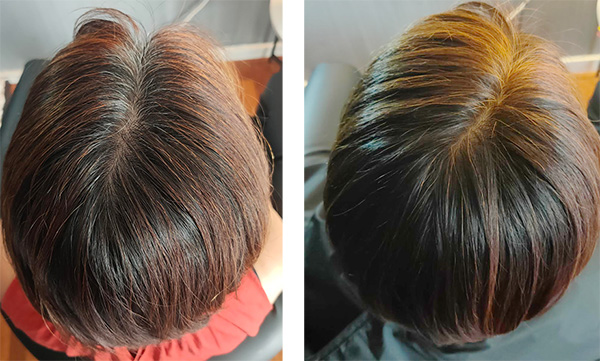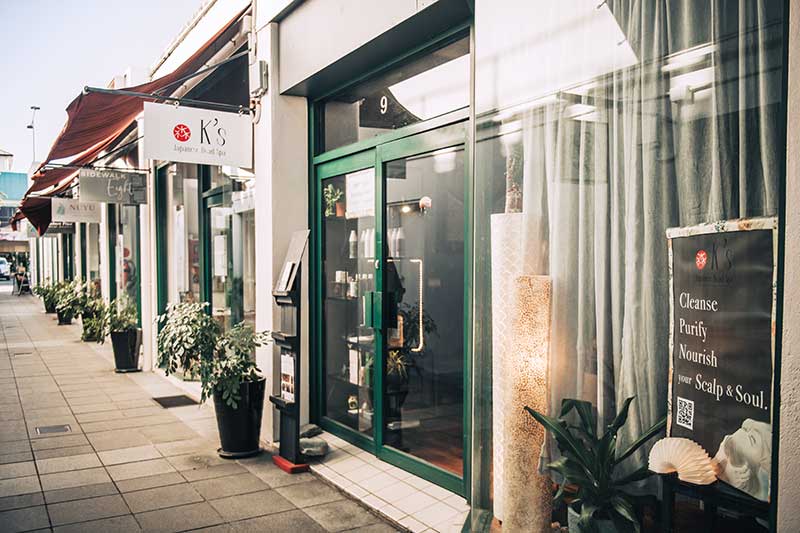Henna
Henna (Lawsonia inermis) is a plant which has been used since antiquity in ancient Egypt to dye skin, hair and fingernails, as well as fabrics. For the Indian Ayurveda (their traditional holistic healing system), Henna has been treated as one of the main herbs. K’s has implemented henna application into our head spa, as we believe in its immense benefits for both You and Earth.
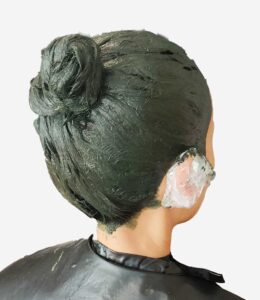
benefits | colour | salon procedure | FAQ | SHOP
Nurture Your Roots.
Celebrate Grateful Ageing.
Nature Blessed Scalp & Hair Treatment
that Colours Grey Hair
For Who?
- Want volume and body for hair
- Want frizzy, dry hair manageable and silky
- Want shine to the dry hair
- Concerned about hair loss
- Having scalp trouble from chemical hair dye
- Want to cover grey hair naturally
- Want sustainable scalp & hair care routine
- Want longer lasting hair colour
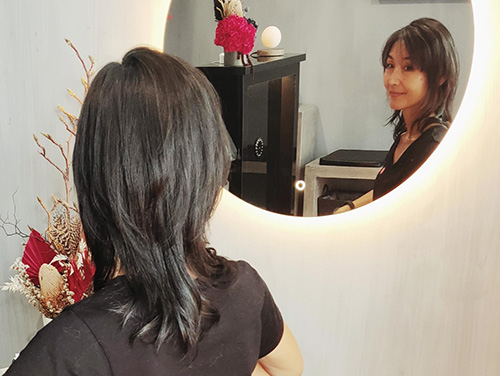
Benefits of Henna
The more you apply henna on your head, the healthier your scalp & hair become, while chemical-based hair dyes can irritate your scalp or cause hair loss.
- Strengthens and beautifies your hair.
- It improves hair growth and reduces hair loss.
- It prevents hair breakage (The lawsone pigment positively restructures the hair proteins)
- It makes hair lustrous and shiny (as henna makes the cuticle layer of the hair smooth and flat)
- It softens hair and improves elasticity
- It rejuvenates dull, damaged, and dry hair
- Cleanses and nourishes your scalp.
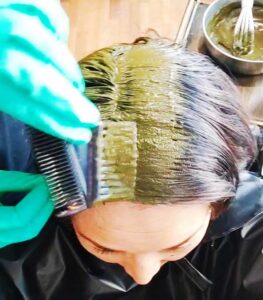
- It extracts residue (pollution, styling products, etc.) as it washes out—like a facial mud mask.
- It detoxes the scalp by its anti-bacterial & anti-fungal properties, and it treats dandruff.
- It protects scalp & hair from UV
- Gives a natural colour & shine to your hair that doesn't fade off quickly.
- Henna detoxifies & balances your body.
Henna goes into our blood vessels through our scalp (just as any other things we put on our skin do). Actually, some studies show that the skin on your scalp is up to 4 times more absorbent than skin around arm.
- Henna promotes the excretion of waste products
- It eases eye strain and headache ( as it softens scalp )
- lawsonia alba in henna detoxifies the liver
- naftakinons in henna balances hormone, and ease PMS, menopause and period pains
- Henna has been used in India as a traditional medicine for: anti-inflammation, dermatitis and heals scars, as well.
- Henna soothes and relaxes you.
- It removes excess heat from the body
- No sharp smell like chemical dye. It smells like green tea
- Henna doesn't pollute our planet.
Have you thought about the chemicals contained in the chemical hair dye making their way to our ocean through the drain ?
In Japan, around 18,000 tones of those are drained from hair salons per year. Henna is one of the solutions for both yours and the earth’s well being.
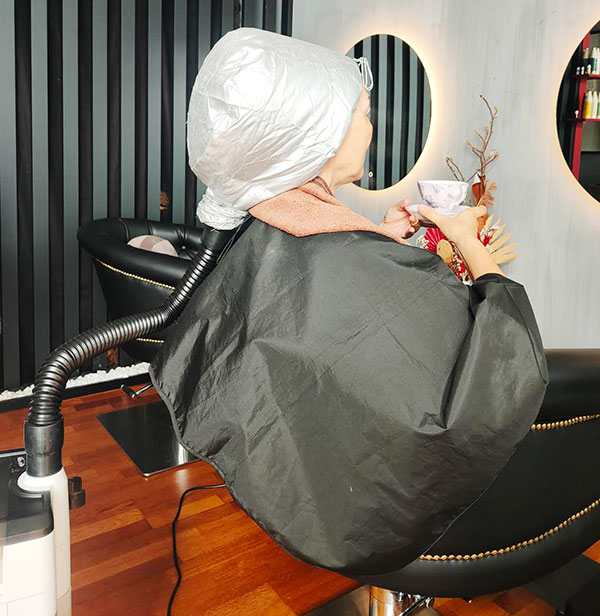
How Henna Dyes Hair
Lawsone (a tannin dye molecule) from henna enters the hair shaft via gaps in the cuticle and strengthens the cuticle by binding with keratin protein (which forms 65%-95% of hair shaft). Rather than stripping the hair of its natural colour and replacing it with the new colour as chemical dyes do, henna’s gentle process maintains the natural structure of the hair shaft, so the hair retains its moisture and flexibility.
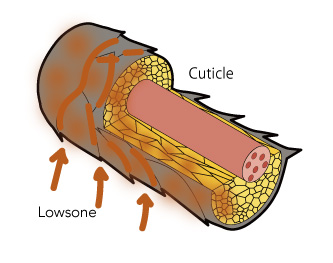
Henna paste coats the hair shaft, then Lawsone gradually migrates into the cortex through gaps in cuticle. Then binds with keratin protein.
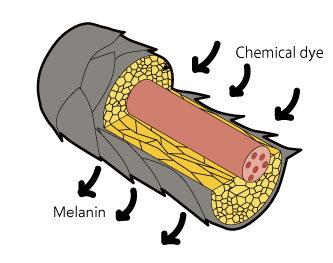
Chemical dyes lift each cuticle and penetrate, stripping natural hair colour off the melanin. Then it deposits new colour into cuticle.
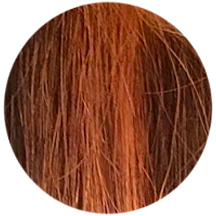
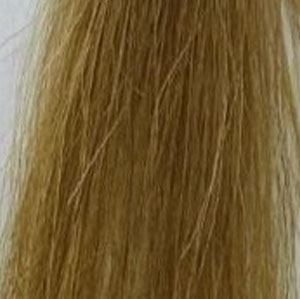
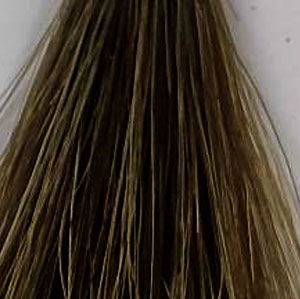
Pure Henna gives an orange tone to your grey or light coloured hair. K’s offers pure herb blended henna to achieve brown to soft black hair colour as well. Below are samples dyed on different coloured hair (Left one is Grey hair). As you can see, darker part of hair won’t undergo significant colour or tone changes.
Please note that finished colour is unique to each individual as unlike chemical dye which override your natural colour, henna reacts to your natural tone. In other words, henna blends well with your existing tone and your hair will look natural.
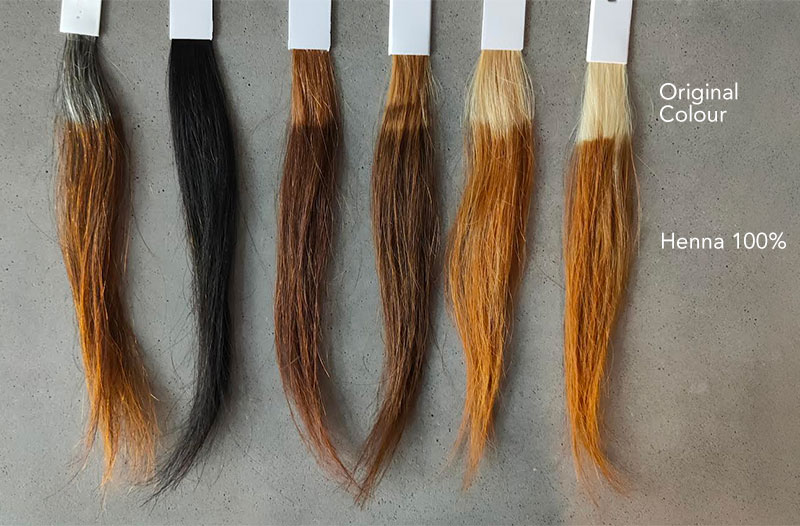
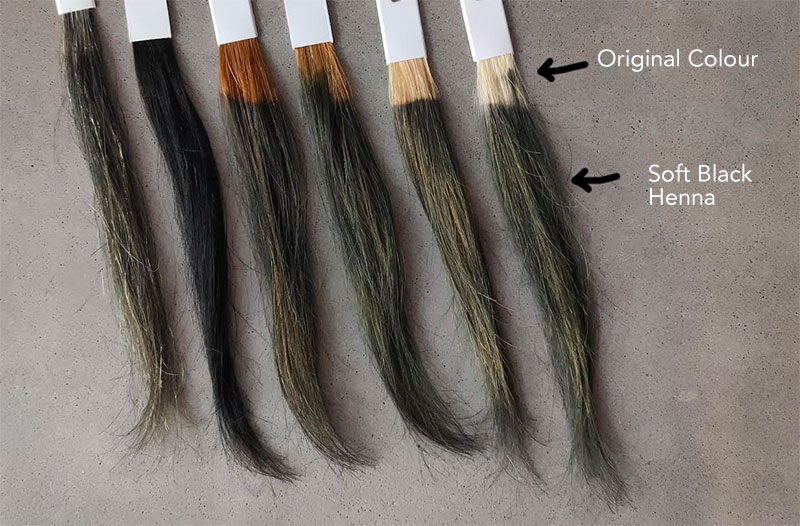
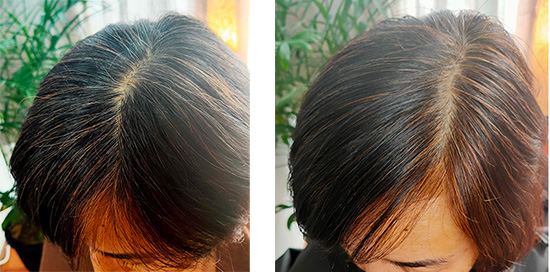
Henna 100%
Gives highlight look on grey hair. Original black hair slightly toned up.
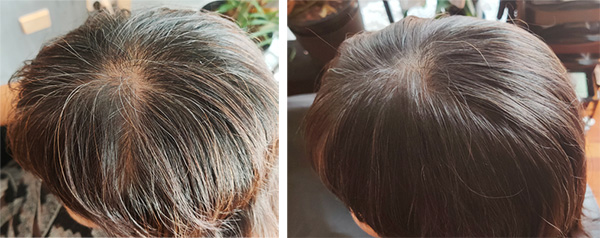
Mocha Brown
Soon after applying, the grey hair look blue-ish. The colour will become dark brown over the next few days as it gets oxdised.
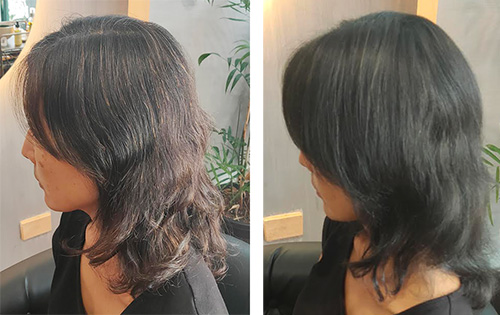
Soft Black
Her hair got softer and smooth after application, thanks to the Ayurvedic herbs contained in the soft black henna.

Extremely happy with the colour & treatment!
She chose henna 100% which blends beautifully with her natural hair tone.
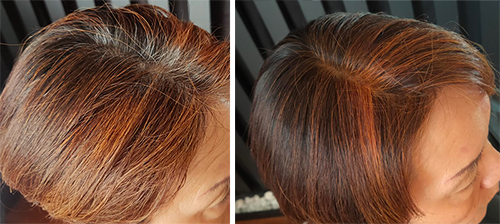
Henna on chemical colour.
Grey regrowth blended well with the rest. The colour will further darken from this over the next few days.
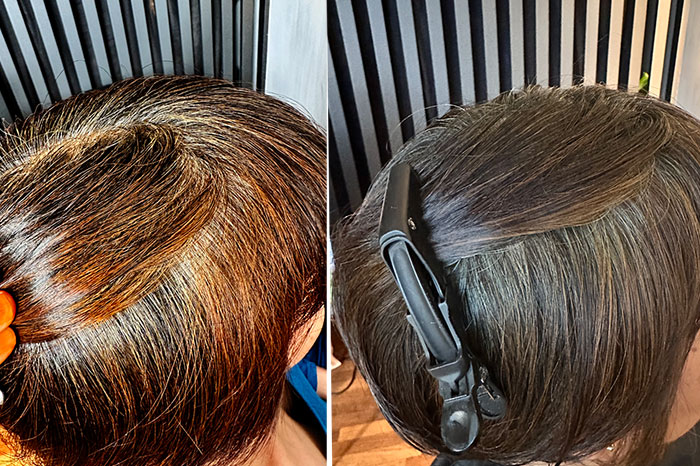
Mocha Brown on Henna 100%
The orange parts changed to subtle brown colour. Hairs look shiny.
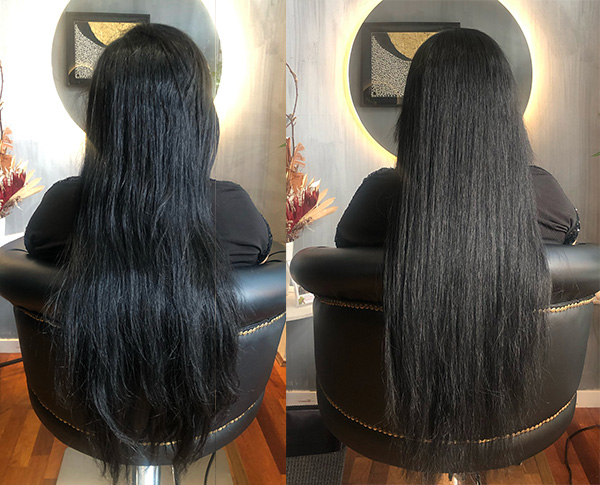
Hair is more manageable
She doesn't have much grey hair, so the henna worked as a hair treatment. The frizz got manageable, and silky.

Henna made my hair healthier and soft.
I love henna.It gives my hair more body and texture (feels thicker) and it makes easy to style.
First Visit
Consultation, Colour selection
We suggest the best option for you by looking at your current scalp/hair conditions and hearing your purpose (scalp/hair improvement or dye grey hair, then how much percent of your hair is grey) as well as your concerns and requirements.
After the 2nd Visit
Scalp massage
Oil helps lifting dirt from scalp and henna penetration.
Henna Application
Leave in with nano mist steamer (20min)
Evenly warming a whole head helps to bring out the best results in dye and treatment. It’s relaxing, too!
Hand massage/ Foot bath add-on available to elevate your experience.
Head Massage at basin
Rinse off
Hair conditioning
Blow dry
Treatment Duration
approx. 90min for regrowth or short hair
120min for mid-long hair
* We recommend a patch test 48 hours prior to your appointment to see allergy reaction. Please contact us for it.
Henna FAQ
No. Darker coloured hair won’t change colour or tone significantly. Henna acts like a tinted manicure, so its subtle orange colour shows on grey or bleached hair (like highlights), however, darker parts won’t undergo significant colour changes. It just give your hair shine and body
We recommend to do the first 3 applications regularly for you to feel improvement on your scalp & hair.
- If grey hair is less than 5% of your hair: once a month
- If grey hair is around 10% of your hair: every 2-3 weeks
- If grey hair is around 20-30% of your hair: every 1-2 weeks
- If grey hair is around 40% of your hair: every week
After that, you could apply henna only on regrowth area (when grey roots are showing, say 4-6 weeks) until you are ready for a fresh treatment.
You can purchase henna powder at K’s to apply at home.
The colour stays rich for 4-6 weeks. Even after the colour naturally fades away, henna stays on and in your hair, and every time you apply, it builds up which makes your hair stronger and more silky.
Unlike chemical hair dye, Henna’s colour is unique to each individual as it reacts to your natural tone. (It doesn’t override like chemical hair dye.) Therefore, it is hard to predict the finished colour. In other words, henna blends well with your existing tone and your hair will look natural.
Yes. However, switching to chemical colouring after applying several henna application may require some time and skills.
You can bleach & chemically dye hennaed hair, but the result may not be exactly what you desired. It depends on how much henna remains in your hair.
Therefore, it is better to do chemical dye or bleach in a couple of months of your 1st henna application.
Allergic reaction to pure henna is extremely rare, however, henna is all-natural, so some people have an allergic reaction to it. If you are concerned, we strongly recommend to do a patch test 48 hours prior to application.
In our salon, the leave-in time is around 25 min. (We use microscopic mist machine to shorten the process time.)
At home, we recommend to leave it for at least 45min.
We conduct head massage, henna application, rinsing, hair conditioning and blow dry. It makes the whole process between 90 and 120 min. (Depends on the hair length.)
No. Don’t worry. Henna oxidises and gets darker and looks natural in a couple of days post application.
Please note that the more you apply, the thicker henna layers get on your hair. That means the colour may look darker on the area. To avoid it, you can apply henna on the regrowth area only for a while and control the tone.
If you applied 100% henna and get itchy scalp, it may be because you have dandruff. As henna is active against fungal and yeast infections (which causes dandruff) and the skin exfoliates.
Otherwise, its more likely a temporary allergy from “indigo” (which is mixed in brown/soft black henna), as its leaves have small pointed prickles.
Please rinse your scalp well with hot water, then discomfort should ease.
If your hair feels dry or crunchy, that’s because the cuticle was slightly raised by moisture and lawsone from the henna paste migrating into your hair.
Your hair is not actually dry or damaged.
If it annoys you, please use conditioner. In a few days, the cuticle scales will settle down and your hair will feel smooth again. (usually smoother than ever before).
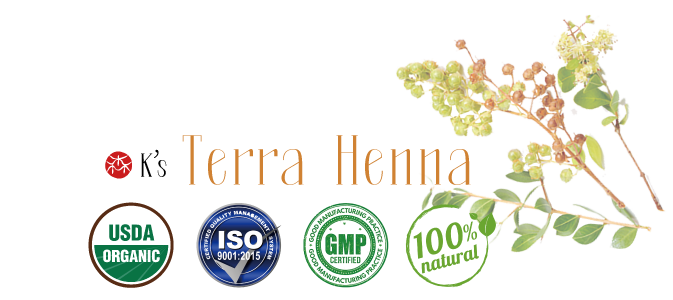
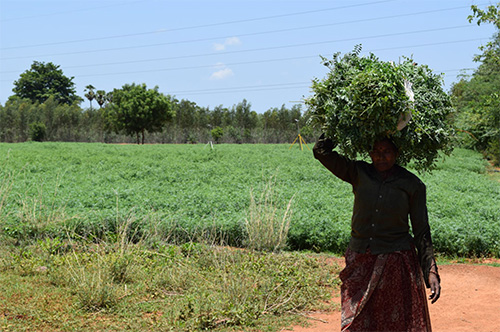
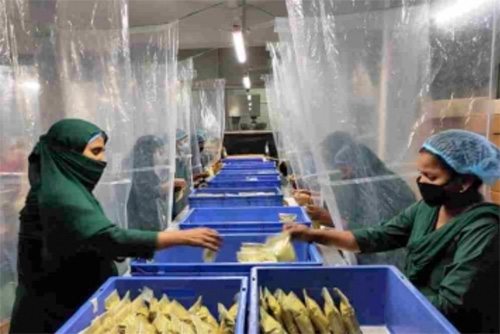
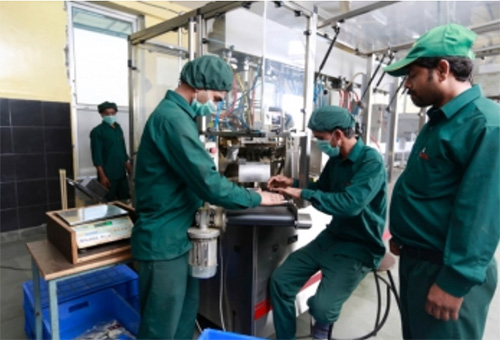
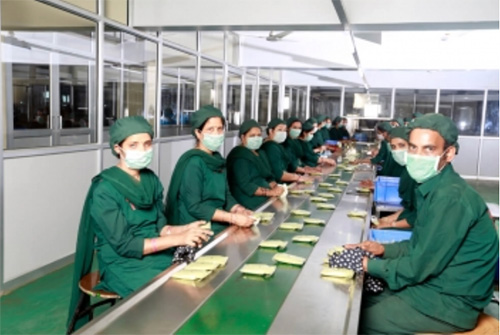
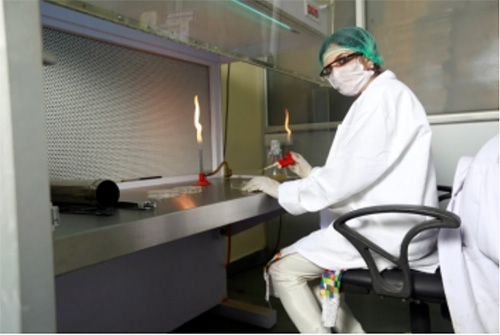


K’s carefully sourced the highest quality henna for you
to make the most of its benefits.
In most cases, non-desired results come from poor quality henna. Unfortunately, the packages say ‘organic’ or ‘chemical-free’ but not all really are. (Henna is a natural plant which grow organically and usually no pesticide required).
Just like other crops, freshness and purity make difference.
“K’s Terra Henna” is produced by the team with an Ayurvedic doctor, and they primarily focus on quality.
They purchase the best quality raw material instead of powder, as they can control and oversee the quality that way, at the best time as per yearly consumption, and filter any extraneous sand during the cleaning process, then store it in their warehouse in proper condition. Good quality henna powder is genuinely made from “leaves” while some henna products contain other parts of the plants or soil and even chemicals.
They even conduct the lawsone (the property to stain hair) content testing of natural henna once a year to maintain the same quality, & other parameter percentages (like purity, lawsone, moisture etc.) in their in-house laboratory throughout the year. That’s why K’s Terra Henna’s leave-in time is much shorter than most of other hennas and the colours turn out vividly.
Finally, their henna is vacuum sealed and packed in an alloy-lined bag (sheltering it from sunlight) to maintain freshness as much as possible.
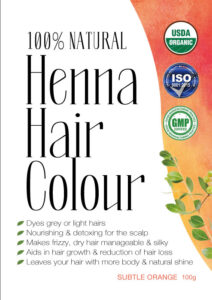
Subtle Orange
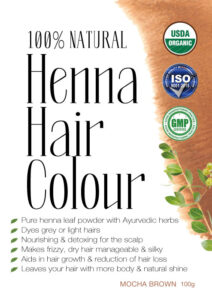
Mocha Brown



